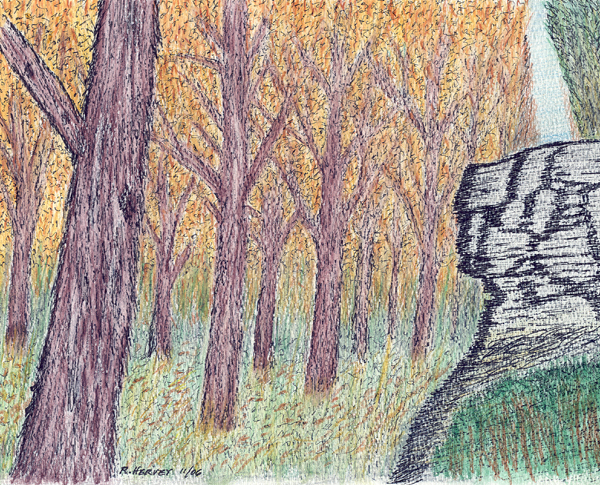Chapter Six
The Hickory Forest
Without saying a word, the two slowed and crept quietly to a small clearing at the edge of the precipice. Behind them was a grove of almost impenetrable cedars whose perfume saturated the forest with an aroma of most intoxicating proportions. Below them, stretching for what seemed to be endlessness, were immense hickory trees, each a full ten feet around, their golden boughs towering above the ledge top, all generously laden with nuts. The boy brushed away some chipmunk's nutshells from his seating area and squatted alongside his grandfather.
"Now we wait," Moses whispered.

They sat still, but what appeared to be stillness was not still at all. The sharp ear could hear and separate many distinct and different sounds, which to the untrained was stillness. Each little rill in the mill brook running over each little rock and every ripple made its own sound. And Moses could hear each one. Each bubble, gurgle and whirlpool fashioned a melody that drifted over the meadow and wove its lyrical way through the forest dancing on every bough. And he knew every note and sang its song. Occasionally a leaf would lose its grasp and fall almost unobserved. But Moses' keen eye would catch it as it left its branch and turned dozens of shades and hues of yellow-gold slowly twisting its way earthward as if clinging to each little ray of sunlight and shunning the deepening shadows.
To the boy's subconscious, it was a simple tranquil melody, but to the man it was the strength of the trees, the rhythm of the stream, the power of the earth, the intensity of sun and sky. It was the music of the earth in all its symphonic majesty.
"Lord God,” said Moses, "of all the many thousands of your beautiful wonders I have witnessed in my days, this may be your most glorious.” He closed his eyes and let the warmth of the sun sink into his soul.
The tranquillity was ended by a soft tug on his sleeve and a whisper.
"Grampa, I hear something,” said Virgil.
The pair listened intently, focusing on a faint rustling of leaves in the distance.
"What do you think it is, Virgie?"
"A squirrel, I imagine,” he replied. "What else could it be here but squirrels?"
"It could be any number of animals,” Moses said. "We’re not the only ones who like squirrels, you know. It could be a fox, a bobcat, a dog, or a deer, or even another man. You must learn to listen to the leaves, Virgie. The leaves can tell you all you want to know. Once you learn how to listen to the leaves, you will always be able to tell what is with you in the woods, even if you can't see. Now listen."
The sounds came closer. "Do you hear the pattern?” Moses asked. He imitated the rhythm. "That’s the sound a squirrel makes when he’s hopping around looking for nuts. He hops.” Moses made the sound. "Then he stops and digs in the leaves.” Moses repeated the sound. "Then he hops some more, and digs again. And it’s always the same. Once you learn the pattern you should never forget. But you must learn to trust your ears, Virgie. It may someday mean your life."
The boy listened intently, committing the sounds to memory. Sure enough, a squirrel soon came into sight, heading right for them. Moses waited until it disappeared behind a close hickory, and then hurled a stone beyond the tree. It crashed into the leaves startling the squirrel, driving it up the tree to safety, but around the side nearest the hunters. As the doomed creature guarded against its unseen foe, Moses silently raised his musket and aimed. A peal of rolling thunder momentarily shattered the peaceful valley.
Darkness fell quickly in the autumn forest. Two shadowy figures emerged from the grayness and traversed the millstream. "Remember Virgie,” said Moses, "you only have one shot, so you must make it count. In the winter when food is scarce it may save you from starvation, and in wartime, one shot may make the difference between victory and defeat. Every shot must count."
"I'll remember, Grampa."